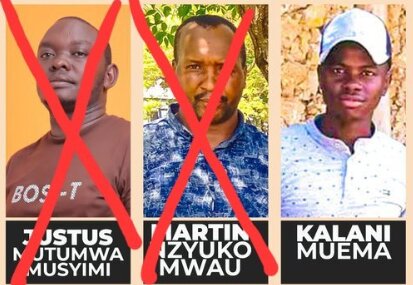Postmortem of Two Bodies from Mlolongo Abductions Reveals Shocking Details
The mystery surrounding the Mlolongo abductions deepens as forensic investigations reveal disturbing details about the two bodies found at Mama Lucy Hospital and Mbagathi Hospital. These victims are believed to be among the Mlolongo 4 men abducted in December 2024 under circumstances linked to enforced disappearances and extrajudicial killings in Kenya.

Findings from the First Body
The first body presented multiple severe injuries to key areas, including the chest, abdomen, and head. Most of the harm was focused on the chest, with internal bleeding found in the thoracic cavity. Medical experts described these injuries as “defense injuries,” often seen when someone tries to fend off an attack. This suggests there may have been a struggle before death.
Despite the detailed analysis of the injuries, the body remains unidentified at this stage. Forensic scientists are relying on DNA samples to confirm the person’s identity. Immediate family members, such as parents and siblings, will provide samples to assist with the process.
Findings from the Second Body
The second body was in an advanced state of decomposition, making the examination more challenging. However, investigators noted significant injuries, particularly to the head and neck. The main injuries on the neck involved damage to the strap muscles, leading experts to conclude that death resulted from manual neck compression.
Unlike the first body, no additional injuries were observed, apart from wounds on the head and neck. This raises further questions about how the fatal injuries were inflicted.
Similar to the first case, this body has not been officially identified. DNA testing is currently underway to determine the victim’s identity, with samples being collected from the family for verification.
The Role of DNA in Identification
While families of the victims have made visual identifications of the bodies, forensic experts have emphasized the importance of scientific evidence. Due to the level of decomposition, visual IDs are not reliable. DNA testing will be used to firmly establish the identities of the victims. This process involves comparing samples taken from the bodies with those provided by close family members.
The DNA analysis is currently ongoing, with families expected to submit samples over the coming days. Until the results are in, the bodies are being referred to as “Unknown Body One” and “Unknown Body Two.”
Why the Families Can’t Proceed With Burial
Understandably, the families are eager to lay their loved ones to rest. However, authorities and medical teams have expressed caution in releasing the bodies for burial. Without confirmed identifications and a full accounting of the cause of death, moving too quickly might compromise any ongoing investigations into the circumstances behind these deaths.
Authorities have assured the families and the public that updates will be provided as soon as new information becomes available.
The Questions That Remain
As the investigation continues, several critical questions linger. Who were these individuals? What led to their tragic deaths? Were they victims of foul play, and if so, who is responsible?
The combination of severe physical injuries, including head and chest trauma in one body and evidence of neck compression in the other, points to the possibility of violent circumstances. However, it’s too early to draw definitive conclusions without further evidence.
What's Your Reaction?















































































































